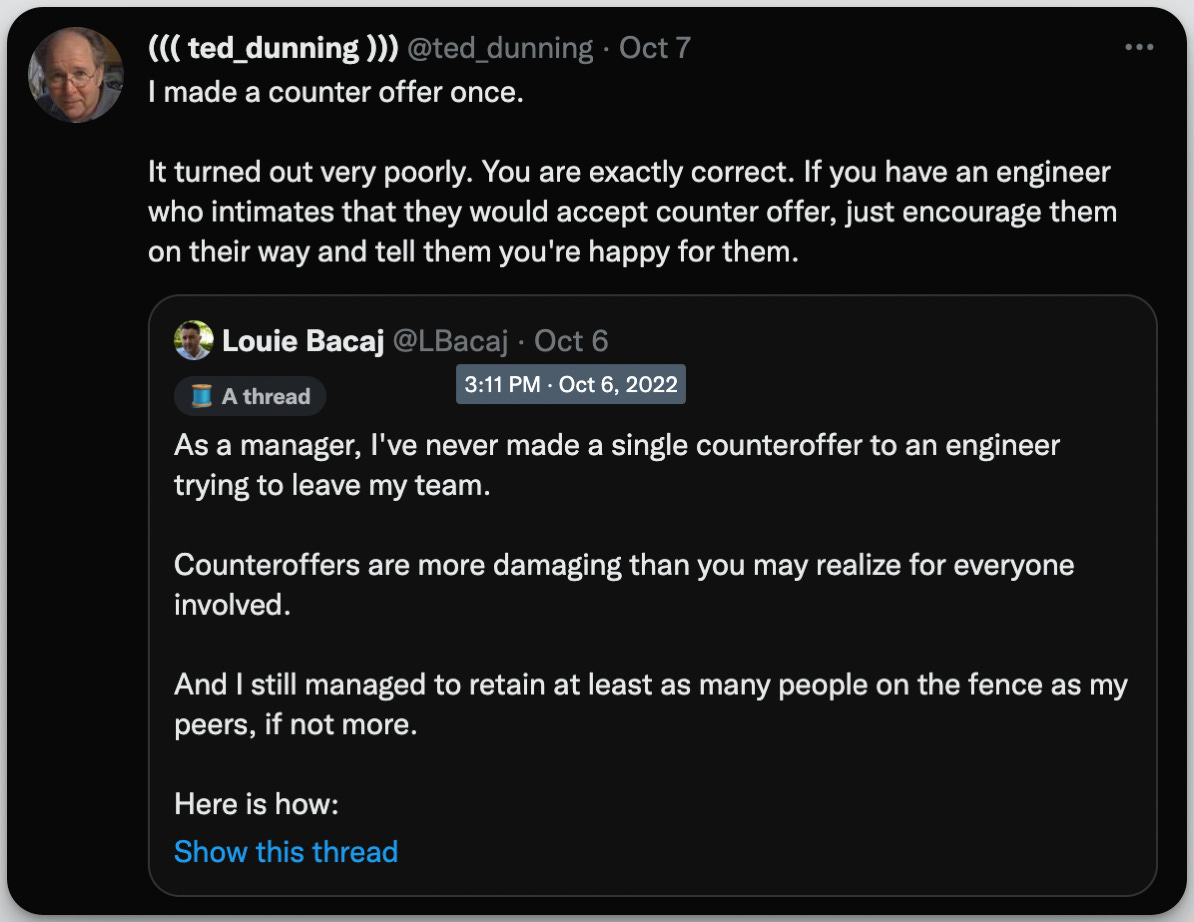M&Ms: Counteroffers
"Alright, we will pay the ransom this time. But keep an eye on him."
That's what a senior leader uttered in an organization I was a part of back when I was a financial software engineer a decade ago. That comment was in response to someone negotiating a counteroffer.
My experience accepting a counteroffer myself and seeing what counteroffers do to other teams has shaped my negative views on counteroffers. Also, that comment from that senior leader didn't help.
I believe counteroffers are rarely any good for the individual, the team, and the organization.
And I recently wrote a thread on this.
Many agree.
And some disagree.
In addition to the thread, I would like to set the record straight with you, add some context, and add to why I don't think counteroffers are any good.
A counteroffer is not good for the individual getting it because negotiating and taking a counter has several harmful effects. I know because I took one early in my career.
In under 12 months after taking a counter, I left the company that gave it to me anyway. After almost doubling my pay, thanks to the counter.
After the counter, expectations changed overnight. I would've doubled my pay if I had just taken the new offer, too, and had no expectations double. But I took the counter. Suddenly I was making a lot more, so they felt they could dump work on me, which was ok at the time because I was young, ambitious, and hungry. But I had expectations with all that additional work I was taking on too. What I wanted most were promotion and increased scope. And when the next promotion cycle came around, they said, "no way you can be up for a promotion for at least a few years. You just received a huge raise."
Besides the expectation miss-match, a counteroffer is also bad for the individual because it seldom addresses the underlying root cause of the problem. The root cause is usually that the organization many times has some of these problems in it:
- not paying people well
- not rewarding people correctly
- not allowing people to grow at an acceptable pace
A counteroffer is like painkillers when there is a severe illness. It only stops the immediate pain; it does not fix anything.
So as an individual, you should be prepared to go back on the interview circuit if you take a counteroffer. Especially if they now expect you to spend years at this new level and salary
And in so many ways, you are better off avoiding this pain of interviewing again by just accepting the new offer because there, you can be promoted on merit and as the opportunity arises and not have to wait on some imaginary timeline. You wont have to convince any senior leaders like the one I quoted above, or HR, that you deserve a promotion.
Then years later, as manager, I saw how counters were affecting a sister team of mine.
A peer at the time, fought hard to get two people in the team large counters. And others on the team inevitably found out; they, too, wanted raises and realized the only way to get them was to go out and get offers from other places. Once others on the team heard how good the painkillers were, they, too, wanted some. But there were only so many to go around before upper management and HR pulled the plug, and the team was in terrible shape.
Counters hurt trust with your team, which strongly signals that the organization has big problems. Many managers, directors, and senior leaders try to keep them a secret exactly for this reason. But this is also why they are bad for the organization because they mask serious illnesses. Organizations should pay people market rates and address many of these things pre-emptively.
But if painkillers mask the real issue, when does anyone get to work on fixing the illness?
Objectively my teams had some of the highest retention rates in the last organization I was apart of. And that wasn't by masking pain but by having honest conversations about it with folks on the team. And by fighting hard to get people what they deserve and want before they have one foot out the door.
This stuff I am saying here, and in my thread, one should do if they want a long-term successful career. Or as a manager, do it if you wish to have a long-term successful team.
But if one wants a quick fix, short term gain for long term pain, I don’t have any experience with how to do that right.
A few Tweets I want to share with you:
I imagine growing people is similar to growing trees. It takes time but its very rewarding long term, and good for the whole world.
And in a world where everyone would rather buy fully grown trees, and there are only so many, those that are good at growing trees have a big advantage.
I love this tweet by Amanda because that’s how I feel about tonights newsletter. And you in it.
It is much easier to share context in here with you and give more than I can on social media, like Twitter.
Two Memes from this week:
I think we live in a world where many people would rather deny reality than address the actual problems.
Interviewing is tough. Thats why if you have to go out to get an offer just to get what you are worth, you are better off just taking the offer.
Thank you for reading the 75th edition of this newsletter.
-Louie
P.S. you can reply directly to this email it will get to me and I will read it.













i enjoyed this read. though i am not an employee, i am using some basic principles from this to inform my ongoing negotiations with my customer
thanks for writing this!
I just realized today that "M&M" stood for Motivation and Memes LOL